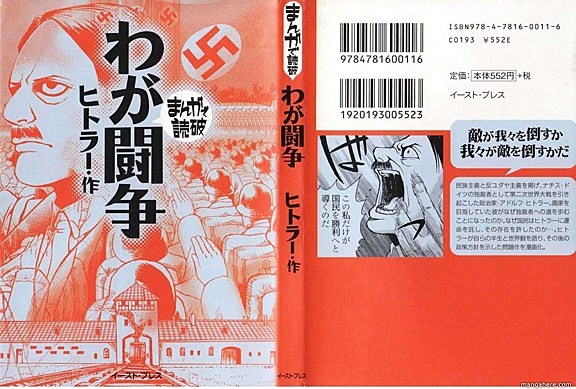
Israeli Ambassador to Japan Persuades ‘Mein Kampf’ Manga Publisher to Create Bible Adaptations

An Israeli ambassador to Japan was disturbed to discover that manga publisher East Press had produced a comic book adaptation of Mein Kampf, the 1945 autobiography-cum-manifesto of Nazi leader Adolf Hitler. Part of a series of adaptations of historically or culturally significant works including Karl Marx's Das Kapital and Charles Darwin's Origin of the Species, the Mein Kampf manga quite naturally struck Ambassador Nissim Ben-Shitrit as distinctly problematic, particularly with respect to younger readers, and worked with the publishers to create manga based on stories from the Bible.

Part of East Press' Manga de Dokuha (Reading Through Comics) series that also includes Dante's Divine Comedy, Fyodor Dostoevsky's Crime and Punishment, Franz Kafka's The Metamorphosis, Friedrich Nietzsche's Thus Spoke Zarathustra and dozens of other titles, the Mein Kampf manga sold especially well, moving approximately 45,000 copies when it was first published in 2008, which according to Anime News Network was approximately 10,000 copies more than the average sales of books from the same line. The book is currently out of print.
"When I saw the drawing of Hitler with swastikas and Japanese captions, I was shocked," Ben-Shitrit told Israeli news service Ynetnews. "It's unthinkable that an enlightened person would read Hitler's book. Luckily, the book has exhausted itself and is no longer on the shelves."
Availability of Hitler's original Mein Kampf text varies from country to country. It's banned outright in some nations, and German rights holder, the Finance Ministry of the German state of Bavaria, has not authorized any domestic publication since it inherited the copyright upon Hitler's suicide in 1945. Mein Kampf goes into the public domain in 2015, in accordance with German copyright law, but other German laws prohibiting dissemination of Nazi propaganda may be invoked to prevent distribution. Some scholars have advocated making Hitler's work available in some kind of annotated and historically contextualized form, but the enormity of Hitler's crimes and the cultural sensitivities surrounding those events and the book itself have made the prospect of new editions problematic, to say the least.
"It is a famous book, but there are few who have read it," said East Press editor Ksuke Maruo, talking to Anime News Network. "I think it is [studying] material for knowing Hitler, a man synonymous with 'devil,' and what sort of thinking created that level of tragedy."
"I don't think that they maliciously intended to publish something anti-Semitic. It's a small company that publishes manga books, and they thought their readers would be interested in it," said the Ambassador, who also expressed hope that "young people in Japan will be exposed to the heroes of the Bible" thanks to East Press' adaptations of several stories from that text -- "Genesis," "Kings," and "Prophets (Messengers)" -- which are said to be available now in both Japanese and English.

Incidentally, images of the new Bible comics that have accompanied this story around the Web seem to correspond to a Bible manga series that began publication several years ago by a Japanese company called Next and localized by Tyndale House Publishers, an American Bible publishing house founded in the 1960s. It's possible these are the comics comics East Press created or that they've been conflated with Next's, I haven't been able to confirm it either way. As is ever the case with manga topics, it appears some details have been lost in the translation.
More From ComicsAlliance
![Mark Russell and Shannon Wheeler Take On the Bible in ‘Apocrypha Now’ [Preview]](http://townsquare.media/site/622/files/2016/05/Apocrypha-Now-feat.jpg?w=980&q=75)



![LBFA Presents: Comics vs. the Bible [Original Comic]](http://townsquare.media/site/622/files/2010/09/marvel-cain-wolverine.jpg?w=980&q=75)




